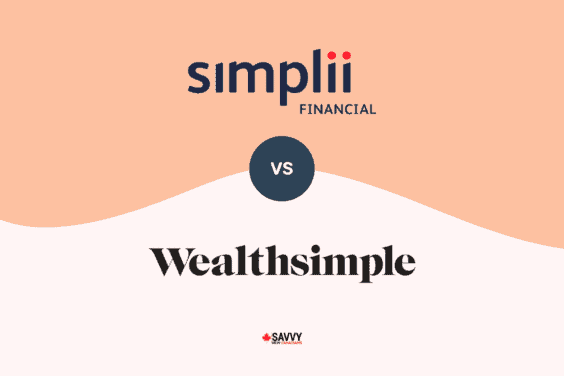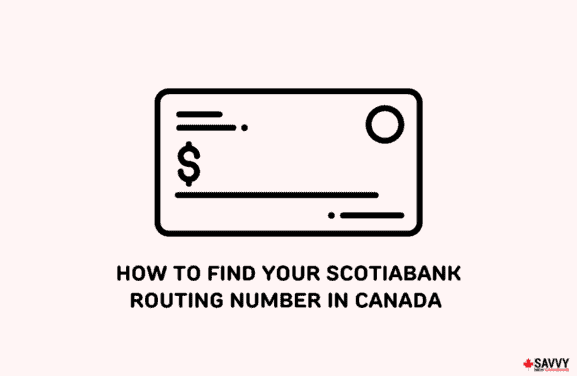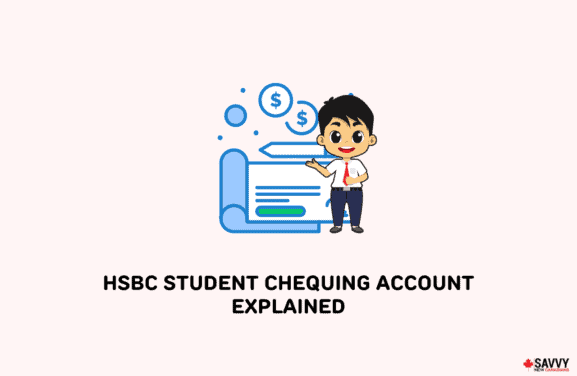An overdraft occurs when you have insufficient funds in your chequing account to cover a debit transaction. Instead of getting hit with non-sufficient fund (NSF) fees, the bank covers the shortfall if you are signed up for overdraft protection.
While overdraft protection services are generally cheaper than paying $45 NSF fees each time your transactions are declined, they can add up to be significant expenses, too.
Learn about overdraft fees and interest for Canadian banks, including TD, CIBC, RBC, BMO, Scotiabank, and others; how to apply for an overdraft, and how to avoid overdraft fees.
What is Overdraft Protection?
Overdraft protection is an optional service provided by banks that helps you cover shortfalls in funding so you can avoid declined transactions and NSF fees.
For example, your chequing account can be overdrawn because someone is trying to cash a cheque you gave them, and your account does not have enough money to clear the cheque.
Instead of getting a bounced cheque, NSF fees, and an embarrassing situation, overdraft protection can help you cover the payment.
Other transactions that can result in overdrafts include pre-authorized debits and bill payments, transfers, and withdrawals.
Overdraft protection is a type of loan and is subject to approved limits. You also pay fees and interest when you use this service.
Some banks also offer an “overdraft transfer service” where they help you move money from one bank account to another to cover insufficient funds and avoid declined transactions.
For example, you can move money from a line of credit or HELOC to your chequing account. This service also has a fee.
Overdraft Fees in Canada
An overdraft fee is what the bank charges you for spending more than you have in your chequing account.
This fee varies by bank but typically consists of a monthly fee or pay-per-use fee.
Monthly overdraft fee: You pay a monthly fee to have overdraft protection. This flat fee is charged whether or not your account is overdrawn during the month and typically costs $5. If you frequently go into overdraft, this plan can be cheaper.
Pay-per-use overdraft fee: You pay a flat fee each time you use an overdraft – typically around $5 per use. This plan may be cheaper if you rarely go into overdraft. Many banks do not offer pay-per-use overdraft protection in Quebec.
Overdraft Interest in Canada
Banks also charge interest on your outstanding overdraft balance.
Overdraft interest in Canada is usually between 19-22%, making overdraft a high-interest loan you should avoid wherever possible.
| Bank | Overdraft Fee (Monthly) | Overdraft Fee (Pay-Per-Use) | Overdraft Interest | Overdraft Coverage |
| TD | $5 | $5 | 21% | Up to $5,000 |
| RBC | $5 | – | 22% | $500 – $5,000 |
| CIBC | $5 | $5 | 21% | $100 – $5,000 |
| BMO | $5 | $5 | 21% | $250 – $2,500 |
| Scotiabank | $5 | $5 | 21% | $250 – $5,000 |
| Simplii | $4.95 | – | 19% | Up to $5,000 |
| Tangerine | $5 | – | 19% | $250 – $5,000 |
Overdraft Fee Example
Assuming you have $500 in your account and you write a cheque for $750. When the payee cashes your cheque at their bank, your bank loans you $250, so the payment clears (assuming you have overdraft protection).
Your chequing account is now overdrawn by $250 plus a $5 pay-per-use overdraft fee.
Your bank balance becomes -$255.
If your bank charges overdraft interest of 21% and you do not pay off your balance for two weeks (14 days), you will also owe interest on the $250 loan at:
($250 x 0.21/365) x 14 days = $2.01.
TD Overdraft
TD’s overdraft protection for its chequing accounts includes up to a $5,000 limit. You can apply for it online or by calling EasyLine telephone banking.
Monthly plans cost $5, or you can opt for pay-as-you-go and pay $5 per use (not available in Quebec).
A 21% annual overdraft interest applies to overdrawn amounts, and balances must be paid within 89 days.
RBC Overdraft
The limit for RBC’s overdraft protection ranges between $500 and $5,000.
And if you have the RBC VIP Banking package, you could get up to $10,000.
Overdraft costs $5 monthly; however, this fee is waived for clients with RBC Signature No Limit Baking and RBC VIP Banking accounts.
Annual overdraft interest for RBC is one of the highest in Canada at 22%.
CIBC Overdraft
CIBC’s overdraft limit is between $100 and $5,000.
The monthly overdraft fee costs $5, and pay-per-use clients also pay $5 (not available in Quebec).
You must pay off balances owed at least once every 90 days.
The monthly CIBC overdraft protection service fee is waived if you have a CIBC Smart Plus Account (21% interest still applies).
BMO Overdraft
Like CIBC and TD, you pay a $5 monthly fee for standard overdraft protection or $5 each time you use the service.
BMO also offers an overdraft transfer service that transfers money from a pre-arranged BMO account to your chequing to avoid overages or insufficient funds. This service cost $5 each time it is used (waived for Premium Plan customers).
The interest rate on overdrafts is 21%.
Scotiabank Overdraft
You can apply for Scotiabank’s overdraft protection and get a limit between $250 and $5,000.
This service is available with a $5 monthly fee, or you could pay on a per-use basis (which also costs $5 each time).
A 21% overdraft interest also applies.
The monthly overdraft protection is waived if you have a Scotiabank Ultimate Package account.
Simplii Financial Overdraft
Simplii Financial is an online subsidiary of CIBC. Clients can qualify for overdraft limits up to $5,000, and a $4.95 monthly fee applies. This is in addition to the 19% interest rate charged on outstanding balances.
You must pay down your overdraft balance at least once every 30 days.
Tangerine Overdraft
Tangerine Bank is a subsidiary of Scotiabank. It charges a $5 fee each month you use an overdraft, and a 19% annual interest rate applies to outstanding balances.
How To Apply For Overdraft
You can apply for overdraft protection by visiting a bank branch. Some banks also allow you to submit an online application from your account’s online banking dashboard.
Approval is subject to your creditworthiness and other factors.
How To Avoid Overdraft Fees
Monitor your balance: Keep an eye on your balance and track your expenses to avoid overdrawing it. I try to schedule pre-authorized debits to coincide with bi-weekly payroll deposits to limit the possibility of a shortfall.
Use balance alerts: Banks are now required to send you alerts when your bank account is running low on funds. Pay attention to these alerts. You may also be able to set custom alerts for specific balance thresholds.
Keep extra cash: While you don’t want all your money sitting in a chequing account earning zero interest, keep a cushion balance for unexpected debits, bill payments, and withdrawals.
Pros and Cons of Overdraft Protection
Pros:
- Avoid declined transactions
- Avoid NSF fees and late payment transactions
- Avoid damage to your credit rating
- Can be useful in an emergency for accessing funds you don’t have
- Avoid embarrassing situations
Cons:
- A $5 monthly fee becomes $60 in extra bank fees each year
- 21% overdraft interest is costly
- Can lead to overspending and increased debt
Related:



